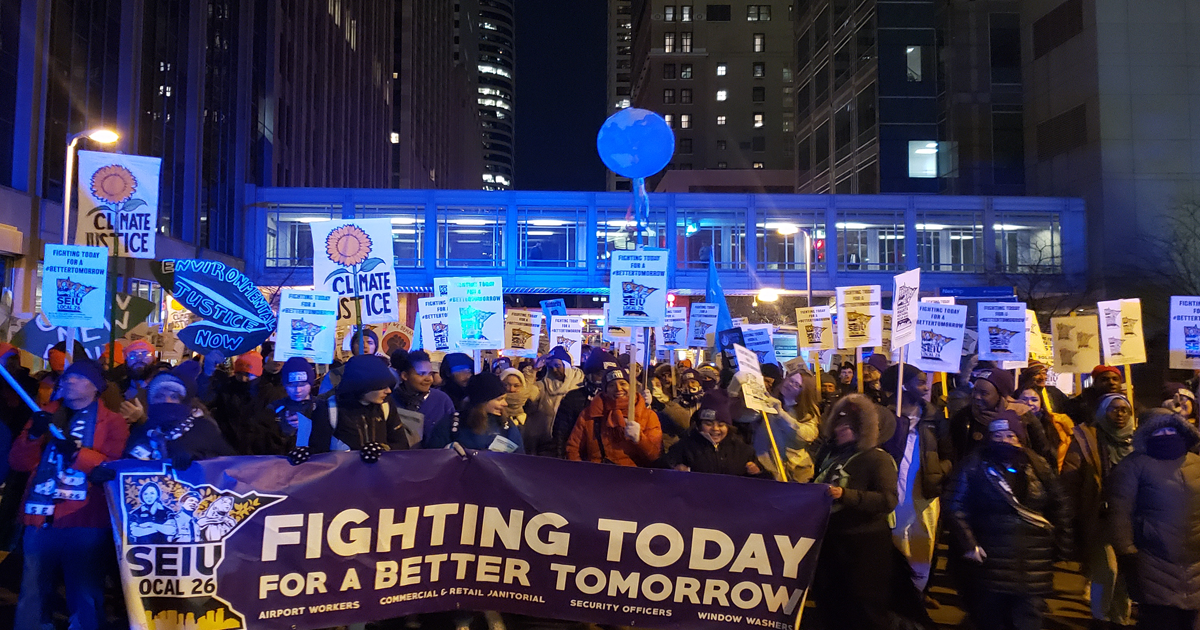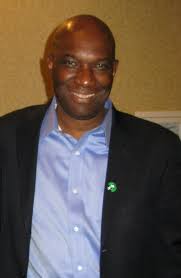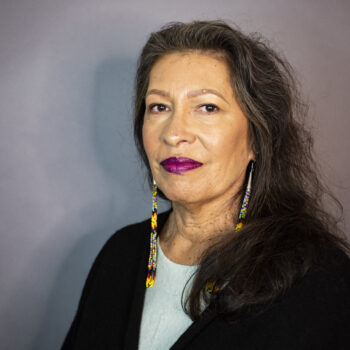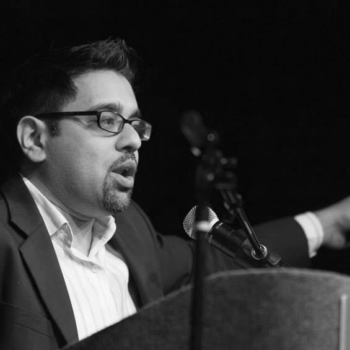On February 27, over 4,000 unionized janitors working at high rise towers in Minneapolis, MN—members of SEIU Local 26—went on strike demanding improvements in wages and working conditions, but also that their employers take action on climate change. Working with partners from Minnesota Youth Climate Strike, Environment Minnesota, 100%, MN 350, the North Star Chapter of the Sierra Club, and the Minnesota Black, Indigenous, and People of Color Climate and Environmental Justice Table, the union presented a set of climate justice demands to the commercial building owners they worked for. The demands included the creation of an Owner and Community Green Table; closure of the HERC incinerator, a major source of both greenhouse gases and air pollution that harms nearby communities of color; and adoption of the union’s proposed Green Cleaning Training Program.
On February 28, a patient near Seattle, WA became the first person in the United States to die of the Novel Coronavirus, or COVID-19. In the subsequent weeks that have felt like months for most of us, life as we knew it quickly unravelled, laying bare the deep structural inequalities that unions and social movements around the country and world have been challenging for decades.
In many ways, the Coronavirus outbreak presages the suffering to be caused by unchecked climate change, while SEIU 26’s strike shows us a path forward. In real time, over the course of weeks, not years, we have witnessed the high price of decades of corporate influence and neoliberal governance. From the lack of paid sick time to stingy and restrictive unemployment benefits to the lack of universal healthcare and access to online learning opportunities for students to the underfunding of vital government agencies, the outbreak has revealed that the emperor has no clothes. Meanwhile, the Minnesota strike sought to unite our movements, taking on climate change, housing and worker justice as interconnected fights.
Our actions to confront COVID 19 in the weeks and months ahead will make a real difference in people’s lives and can demonstrate the power and importance of collective action, not only for addressing the Coronavirus, but also the climate and the inequality crises our movements are confronting. The Minneapolis strike represents the spirit of the type of action we must take to forge a more democratic and sustainable economy – it appears to have been the first union-sanctioned work stoppage in the U.S. to include climate protection demands. It also represents the latest manifestation of a phenomenon that has come to be known as Bargaining for the Common Good (BCG). BCG is an innovative approach for bringing unions and allies together to shape bargaining demands that advance the mutual interests of workers and communities alike. BCG campaigns seek to increase investment in underserved communities and confront structural inequalities—not simply to agree on a union contract.
To date, BCG campaigns have been launched around issues of education, racial justice, public services, immigration, finance, housing, and privatization. But they are in many ways perhaps best suited to taking on the overarching existential issues such as global pandemics and human-caused climate change that intersect with and often exacerbate all of these other issues.
A Common Good Framework for Climate Justice
In a 2019 article, Nato Green of SEIU Local 1021 called for unions to join with community partners and bargain over climate change. He argued that the Green New Deal resolution introduced to Congress by Representative Ocasio-Cortez and Senator Markey opened the possibilities of constructing a common good framework through which to confront the climate catastrophe. A more recent piece by Jeremy Brecher of the Labor Network for Sustainability draws a clear line between ongoing worker and community efforts to address the public health crisis of COVID-19 and the development of an “Emergency Green New Deal.” Building from these insights, we outline three areas in which BCG campaigns could link to existing climate justice and public health work on the local level: climate change mitigation, environmental equity, and just recoveries. BCG campaigns in these three areas could effectively link local efforts to national campaigns and begin to make the Green New Deal happen locally, from the ground up, while we also continue to fight for the change that is needed at the federal level.
Demanding Climate Change Mitigation
In partnership with local environmental organizations and climate change activists, unions can develop demands and organize contract campaigns that seek reductions in emissions by their employers. Unions can demand the formation of joint labor-management committees on greenhouse gas (GHG) emissions reduction such as the postdoc bargaining unit of the Rutgers AAUP-AFT has demanded in their ongoing contract campaign. Such committees can be tasked with assessing the employer’s emissions profiles and developing climate action plans to reduce GHG emissions, including enforceable targets. When fossil fuel facilities are closed, climate and community groups can play a role in converting those jobs into jobs that repair the damage to their communities.
Unions and allies can also demand divestment of pensions and endowments from fossil fuel companies and move those funds instead into socially responsible investments. Other demands might include the expansion of public transportation options, the free provision of mass transit to students or employees, and monetary or other incentives for workers who walk, bike, or use public transportation to commute. Provisions can be made for some workers to telecommute part-time to reduce unnecessary emissions when work can be completed remotely.
The demands of particular unions will likely be shaped by the sector in which they operate and their geographical location. For example, transportation workers might demand the electrification of bus fleets as some ATU locals have begun to do. Teachers and public employees can demand that public buildings be made energy-efficient and have publicly owned rooftop solar installed. Private sector workers can demand electric vehicle charging stations be installed in employee parking lots and garages and that 401K retirement plans include fossil-free investment options.
Ironically, the economic slowdown caused by the COVID-19 outbreak has slowed GHG emissions to levels that approach the targets we should be hitting currently. A BCG approach would start with unions and local community groups working together to develop and articulate a set of demands that serve the interests of workers and the communities where they live and work as we come out of this crisis. In this way, workers can become a positive force in the struggle to reduce GHG emissions.
Demanding Environmental Equity
A recent study in the Proceedings of the National Academy of Sciences found that air pollution exposure in the United States is disproportionately caused by consumption of goods and services by the non-Hispanic white majority, but disproportionately inhaled by black and Hispanic minorities. The story is similar in Indian Country, where climate profiteers continue their efforts to despoil tribal lands with such oil pipeline projects as the Dakota Access and the Keystone XL. Those who’ve lived downstream from the capitalist machine have suffered the ill effects of polluted land, water, and air since the earliest days of industry.
Unions and community partners can make environmental justice issues a centerpiece of their bargaining campaigns to secure an equitable distribution of environmental burdens and benefits. Lead in public water supplies is a tremendous health hazard to residents in frontline communities from Newark to Flint to the Navajo Reservation. Workers and community activists can together demand the repair or replacement of poisoned water pipelines not just in the workplace, but in the entire community. They can demand the cleanup of the groundwater and aquifers that feed those pipelines. Unions and community members near bus depots and other public transportation hubs can demand the electrification of vehicles in order to reduce both asthma-causing particulate matter pollution, as well as GHG emissions.
Following the lead of the United Steelworkers and some local labor-environmental coalitions like the New Jersey Work Environment Council, unions in manufacturing, mining, and chemical plants can demand the right to know the names and health impacts of all chemicals used within the plant and demand that the same information be shared with the local community. Joint labor-management-community committees can be established to monitor and reduce pollution levels. When a less toxic chemical can be used in production processes, it should be mandated, regardless of cost differences.
Workers can also demand more green spaces in urban communities, as the UTLA has demanded for their schools. To ensure shared economic benefits of the growing green energy sector, unions and community partners can demand that a percentage of hires be from local communities where polluting facilities were located. Union apprenticeship programs could be established to create a jobs pipeline for historically marginalized workers. The Illinois IBEW and Little Village Environmental Justice Organization have been working to build this type pipeline for Chicago workers.
Demanding Just Recoveries
Our current experience with the COVID-19 outbreak reminds us that disasters are not experienced equally – due in part to existing inequalities but also to the way our nation’s relief efforts are designed. Disaster relief and recovery dollars are tied to race, homeownership, and education. Wealthy and disproportionately white men make money during recoveries; poor black and brown people lose money. Under the cover of disaster, wealth is redistributed upwards.
Indeed, public health crises, like the current outbreak. and climate catastrophes provide opportunities to create even more inequality. After Hurricane Katrina, the federal government suspended the Davis Bacon Act and affirmative action in contracting, while New Orleans decertified the Teachers Union – all under the cover of disaster recovery. More recently, the American Hospital Association has urged Congress to withdraw certain workplace safety standards from the relief package in response to the Coronavirus pandemic.
But workers and communities have opportunities as well. After Superstorm Sandy, the New York State Nurses Association contributed labor and resources to helping neighbors recover. After Hurricane Maria hit Puerto Rico, the teachers’ unions did the same. As the COVID-19 outbreak began to ravage New York in March of 2020, teachers threatened a “sick out” to demand the closure of schools accompanied by efforts to distribute food to families who need it. Detroit bus drivers did the same to stop the operation of crowded buses that lacked hand sanitizer or gloves and masks for the drivers during the outbreak. The impulse to provide aid and alleviate immediate suffering can be translated into long-term engagement that can lead to more egalitarian structural change.
Communities seeking to rewrite the rules of disaster response to achieve greater resilience and equity can begin by drafting a “disaster recovery bill of rights” to inform and help move “contracts for recovery” for workers and local communities. These could be drafted collaboratively by local unions in partnership with community organizations and pushed for adoption in contract bargaining campaigns and at the municipal, county or state level of government. They could include a set of protections for workers and community members, such as the right to living wages for cleanup workers and the right to return home for residents without eviction or job loss. They could establish local water or land use codes by local entities. They could also help to ensure a just transition for workers who face job loss and communities that are economically devasted by plant or factory closures. Fighting for these new rules for recovery locally through BCG campaigns could coincide with and reinforce ongoing union legislative efforts to expand the social safety net, including more public money in unemployment insurance and food stamps, new social supports such as universal healthcare coverage, and a public jobs program as well as protections of tribal sovereignty. These new rules – or disaster recovery rights – could also reinvent housing, transportation, education, environmental impact monitoring and healthcare systems to serve working class and tribal communities.
Coming to a Contract Campaign Near You?
As the climate catastrophe has shown us time and again, and that more recently the Coronavirus outbreak is demonstrating, the unchecked corporate and financial powers-that-be will always place profit before human wellbeing. However, times of crisis can also be times of opportunity for radical change, if action is taken. In February, the Minneapolis janitors became the first U.S. union to go on strike for climate justice. In recent weeks, local unions across the country have responded to the global pandemic by articulating demands that meet the needs of their members and the communities they live and work in. By broadening labor’s bargaining demands to include these common good concerns, BCG campaigns can open an important new front for challenging the corporate and financial powers that drive inequality and help pave the road to building the just, equitable, and sustainable economy we all need and deserve.




